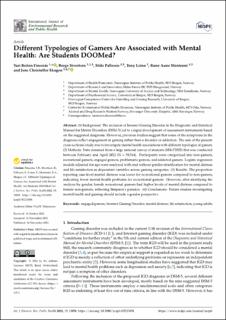Different Typologies of Gamers Are Associated with Mental Health: Are Students DOOMed?
Finserås, Turi Reiten; Sivertsen, Børge; Pallesen, Ståle; Leino, Tony Mathias; Mentzoni, Rune Aune; Skogen, Jens Christoffer
Journal article, Peer reviewed
Published version

Åpne
Permanent lenke
https://hdl.handle.net/11250/3037269Utgivelsesdato
2022Metadata
Vis full innførselSamlinger
Originalversjon
International Journal of Environmental Research and Public Health (IJERPH). 2022, 19 (22), 15058. 10.3390/ijerph192215058Sammendrag
(1) Background: The inclusion of Internet Gaming Disorder in the Diagnostic and Statistical Manual for Mental Disorders (DSM-5) led to a rapid development of assessment instruments based on the suggested diagnosis. However, previous studies suggest that some of the symptoms in the diagnosis reflect engagement in gaming rather than a disorder or addiction. The aim of the present cross-sectional study was to investigate mental health associations with different typologies of gamers. (2) Methods: Data stemmed from a large national survey of students (SHoT2022) that was conducted between February and April 2022 (N = 59,544). Participants were categorized into non-gamers, recreational gamers, engaged gamers, problematic gamers, and addicted gamers. Logistic regression models adjusted for age were analyzed with and without gender-stratification for mental distress and life satisfaction as dependent variables across gaming categories. (3) Results: The proportion reporting case-level mental distress was lower for recreational gamers compared to non-gamers, indicating fewer mental health problems for recreational gamers. However, after stratifying the analysis by gender, female recreational gamers had higher levels of mental distress compared to female non-gamers, reflecting Simpson’s paradox. (4) Conclusions: Future studies investigating mental health and gaming should include a gender perspective.
